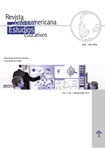Authors
Abstract
Digital game-based learning is foreseen as one of the technologies with higher potential in the educational field in the short term. This is because videogames are part of the students’ culture and one of the activities in which they occupy most of their free time. However, what happen with teachers? How can they make an effective use of this technology, especially if most of them are unfamiliar with it? In order to answer these questions, this paper describes an authoring tool for the creation but also for the monitoring of educational massive multi-player on-line games. Additionally, a preliminary validation of such a tool with two math teachers from different grades is presented, which was made in three phases: design, implementation and development. Finally, such a validation was complemented with a survey to analyze the experience of those teachers with regard to the required effort during the two first phases as well as their perception about the advantages and disadvantages of the approach used.
References
Chuang, T. & Chen, W. (2009). “Effect of Computer-Based Video Games on Children: An Experimental Study”. Journal of Educational Technology & Society, No. 12, Vol. 2, pp. 1-10. Coller, B. & Scott, M. (2009). “Effectiveness of using a video game to teach a course in mechanical engineering”. Computers & Education, Vol. 53, No. 3, pp. 900-912.
Corneliussen, H. & Walker, R. (2008). Digital culture, play, and identity: A World of Warcraft reader. Boston: The MIT Press.
de Freitas, S. & Griffiths, M. (2009). “Massively Multiplayer Online Role Play Games for Learning”. En: Ferdig, R. (ed.). Handbook of Research on Effective Electronic Gaming in Education. Kent: Research Center for Educational Technology.
González, C. & Blanco, F. (2011). “Designing social videogames for educational uses”. Computers & Education, Vol. 58, No. 1, pp. 250-262.
Johnson, L., Adams, S., Cummins, M. (2012). The NMC Horizon Report: 2012 K12 Edition. Austin: The New Media Consortium.
Kim, S. & Chang, M. (2010). “Computer Games for the Math Achievement of Diverse Students”. Journal of Educational Technology & Society, Vol. 13, No. 3, pp. 224-232.
Lawrence, R. (2006). “Teaching data structures using competitive games”. IEEE Transactions on Education, Vol. 49, No. 1, pp. 459-466.
Marín, Y., Ramos, A., Montes, J., Hernández, H., López, J. (2011). “Juego didáctico, una herramienta educativa para el autoaprendizaje en la ingeniería industrial”. Revista Educación en Ingeniería, Vol. 12, pp. 61-68.
Moreno, J., Montaño, E. (2009). ProBot: juego para el aprendizaje de lógica de programación. XIV Taller Internacional de Software Educativo, Santiago de Chile.
Moreno, J., Montaño, E., Montoya, L. (2012). Creación y monitoreo de videojuegos educativos multi-jugador masivos en línea. Séptima Conferencia Latinoamericana de Objetos y Tecnologías de Aprendizaje, Guayaquil.
NarabaWorld. (2010). “¿Qué es eso de Game-Based Learning?”. En: http://www.narabaworld.com/es/node/37 [consultado 5 de noviembre de 2012].
Padilla, N., Collazos, C., Gutiérrez, F., Medina, N. (2012). “Videojuegos educativos: teorías y propuestas para el aprendizaje en grupo”. Ciencia e Ingeniería Neogranadina, Vol. 22, No. 1, pp. 139-150.
Prensky, M. (2001). “Digital natives, digital immigrants”. On the Horizon, Vol. 9, No. 5, pp. 1-6.
Susaeta, H., Jimenez, F., Nussbaum, M., Gajardo, I., Andreu, J., Villalta, M. (2010). “From MMORPG to a Classroom Multiplayer Presential Role Playing Game”. Educational Technology & Society, Vol. 13, No. 3, pp. 257-269.
Tan, C. (2013). “MOOCs vs MMOGs”. En: Mandal, P. (ed.). Proceedings of the International Conference on Managing the Asian Century. Singapore: Springer.
Voulgari, I., Sampson, D. (2014a). “Massive Open Online Courses (MOOCs) and Massively Multiplayer Online Games (MMOGs): Synergies and Lessons to be Learned”. En: Sampson, D.G., Ifenthaler, D., Spector, J.M., Isaias, P. (eds.). Digital Systems for Open Access to Formal and Informal Learning. New York: Springer.
Voulgari, I., Sampson, D. (2014b). “Applying Lessons Learnt from Massively Multiplayer Online Games (MMOGs) to Massive Open Online Courses (MOOCs)”. 14th International Conference on Advanced Learning Technologies, IEEE.
Tribus, J. (2009). Game-Based Learning: What it is, Why it Works, and Where it’s Going. New York: New Media Institute.
Vigotsky, L.S. (1978). Mind in Society: The development of higher psychological processes. Cambridge: Harvard University Press.

 PDF (Español)
PDF (Español)
 FLIP
FLIP



















